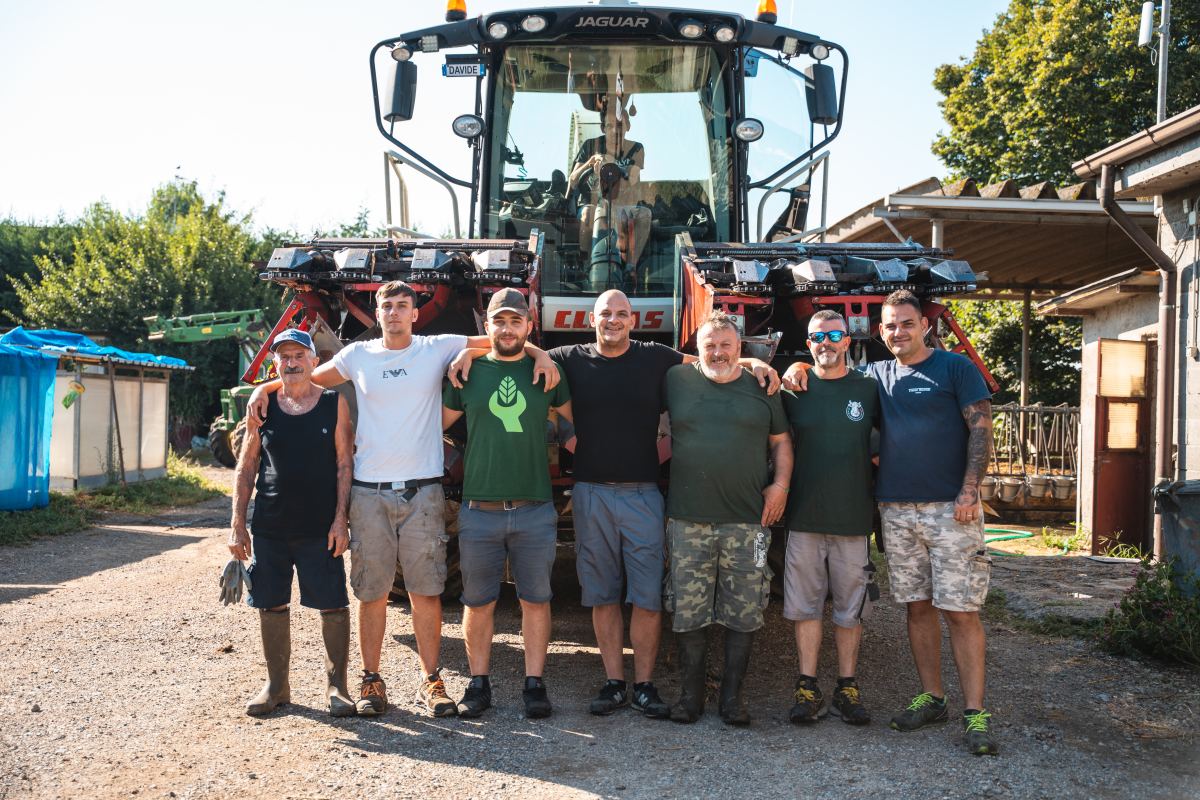Sustainable dairy farming and quality feed: Crespi Invernizzi's success

Massimo Crespi runs Crespi Invernizzi Farm in Sedriano, close to Milan, where they raise high-quality dairy cows. With around 190 cows, the farm is known for producing excellent milk and is part of the San Angiolina cooperative, famous for Grana Padano cheese.
The farm’s story began in 1982, when Massimo’s father and uncles started the business. In 2015, Massimo, his brother Alessandro and his cousin Samuele took over, continuing the family’s legacy of sustainable dairy farming.

A commitment to high-quality feed production
At Crespi Invernizzi, the focus is not only to raise healthy cows but also to produce high-quality dairy cattle feed — all while upholding high standards in sustainability.
The farm grows a variety of crops, including alfalfa, permanent grasslands, sorghum, autumn-winter crops, and corn. These are carefully selected to meet the nutritional needs of the cattle. The sorghum and autumn-winter crops provide the fibre needed for the animals’ diet, while corn is used for its high starch content, which is vital for supporting strong energy levels and overall health in cows.
Forage management: Adapting to climate challenges
Extreme weather patterns in recent years have posed significant challenges for forage production and animal welfare at Crespi Invernizzi, with increased water stress and unpredictable conditions threatening crop yields and feed quality.
To combat these issues, the farm has introduced resilient crops such as sorghum, which can endure harsh climatic conditions and provide a stable food source for cattle. Additionally, the farm has optimised forage management by incorporating Egalis® inoculants from Alltech, which significantly improve nutrient protection and reduce dry matter loss.
Massimo highlights the positive impact of utilising Egalis solutions, with notable enhancements in silage mass, particularly in terms of acidification and stability. The solution ensures consistent feed availability but also supports the overall health of Crespi Invernizzi’s livestock. The improved nutritional value and long-term stability of the silage contribute to better performance and well-being for the animals, even after extended storage periods.
These strategies collectively help mitigate the effects of climate change and improve carbon footprint, securing both sustainable farming practices and optimal livestock nutrition.
The practical benefits of Alltech’s Egalis line
One of the standout features of the Egalis line which significantly benefits the dairy industry is its ease of use. The products dissolve effortlessly in solution and do not cause any operational issues, even when applied during fieldwork. At Crespi Invernizzi, this practicality has made it easier for the team to integrate the inoculants into their harvesting routines.
Moreover, Egalis does not require refrigeration, which makes it even more convenient for storage. The silage inoculant can be kept in a dry, normal-temperature environment, saving the farm both space and energy costs.
Continuous monitoring of feed quality and forage management
At Crespi Invernizzi, maintaining the highest-quality feed is a top priority. The farm works closely with a dedicated animal nutritionist who regularly monitors the quality of the feed and silage. The nutritionist ensures that both the stored feed and mixed feed are up to standard, helping the farm maintain optimal milk production. In particular, the farm focuses on managing the dry matter content and the NDF (neutral detergent fibre) levels of the crops, which play a crucial role in the nutritional profile of the feed.
The link between high-quality feed and superior milk production
The team at Crespi Invernizzi knows that the key to producing high-quality milk lies in the quality of the feed. This is especially important for Crespi Invernizzi as it supplies milk to a dairy factory that produces Grana Padano cheese. The direct correlation between high-quality silage and superior milk production has been evident on the farm, and Massimo emphasises that the farm’s success is due to a continual focus on the nutritional value of the feed.
Technical support from Alltech: A valuable partnership
In addition to the benefits of the Egalis line, Crespi Invernizzi values the ongoing technical support provided by Alltech. The Alltech team assists the farm at each step of the process, from evaluating crops before harvest to inspecting the silage during the fermentation process. This collaboration has been crucial for optimising feed quality and ensuring long-term success.
Self-sufficiency through sustainable practices
One of the farm's core goals is to be as self-sufficient as possible when it comes to producing feed for the cows. By growing its own crops, Crespi Invernizzi not only ensures high feed quality but also reduces costs associated with purchasing external feed. This focus on self-production aligns with the farm’s commitment to sustainability and long-term profitability.
Conclusion: A model for sustainable dairy farming
Crespi Invernizzi Farm’s success is a result of careful planning, innovative practices, and a commitment to producing high-quality feed. By embracing sustainable farming techniques, such as the introduction of resilient crops like sorghum and the use of Alltech’s Egalis line for silage management, this farm has been able to overcome the challenges posed by adverse weather and maintain the health and productivity of its cattle.
As Crespi Invernizzi continues to evolve, its focus on quality and sustainable forage management will undoubtedly ensure its continued success in the dairy farming industry.
About the author:

Elisa Boschi is the global head of marketing for resource efficiency at Alltech's Technology Group. She leads marketing efforts in crops, silage management, and waste management. With 19 years at Alltech, Elisa most recently served as the ruminant marketing manager for Europe. Based in Italy, she enjoys reading, gardening, walking, and dining with family and friends.















